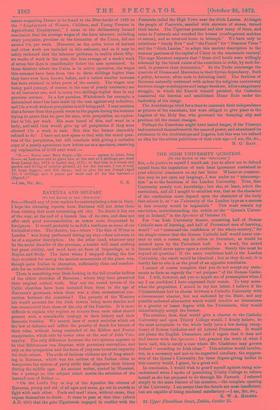RAVENNA AND BELFAST.
ao TEM EDITOR OF THE "SPECTATOR."
Snt,—Should any of your readers be contemplating a tour in Italy, I hope the alarming reports from Ravenna will not deter them from visiting that most interesting old city. No doubt it lies out of the way, at the end of a branch line of its own, and does not offer such good accommodation as towns more frequented by foreigners. It would probably be as dull a residence as some of our Cathedral cities. The theatre, too—where "The Sale of Wives in London" was being performed during my stay—does not seem to be of a superior description. On the other hand, whatever may be the social disorder of the province, a tourist will meet nothing but great civility, and need have no fears of brigandage, as in Naples and Sicily. The hotel where I stopped during the few days required for seeing the ancient monuments of the place was, though quite Italian in character, sufficiently clean and comfort- able for an unfastidious traveller.
There is something very Irish-looking in the tall circular belfries of the oldest churches of Ravenna ; where they have preserved their original conical roofs. May not the round towers of the Celtic churches have been imitated from them in the age of Ravenna's greatness, when there was a close ecclesiastical con- nection between the countries ? The poverty of the Western isle would account for the Irish towers being more slender and less ornamented than those of the city of the Exarchs. It is more difficult to explain why regions so remote from each other should present such a remarkable analogy in their history and their domestic troubles. We cannot hear of secret societies which set the law at defiance and inflict the penalty of death for breach of their rules, without being reminded of the Ribbon and Fenian conspiracies, which rule by terror even at the seat of Irish Vice- royalty. The only difference between the two systems appears to be that•Ribbontnen can dispense with pecuniary corruption, and rely on the sympathies and the fears of jurymen to secure impunity for their crimes. The evils of factious violence are of long stand- ing in Ravenna, which was the earliest of the Italian cities to inaugurate the system of party strife that disgraces their history during the middle ages. An ancient writer, quoted by Muratori, has a passage on this subject which merits the attention of the learned men of Belfast :—
" On the Lord's Day or day of the Apostles the citizens of Ravenna, young and old, of all ages and sexes, go out in crowds to tight with each other. Fools and mad ! since, without cause, they expose themselves to death. It came to pass at that time (about A.D. 696) that the gate Tiguriensis engaged in conflict with the
Posterula called the High Town near the ditch Lamisa. At length the people of Posterula, assailed with showers of stones, turned their backs. The Tigurians pursued and slew many of them, and came to Posterula and wrecked the houses (confregerunt molchas et serras), and so returned home in triumph." We have only to substitute "Sandy Row" and "the Pound "for " Summus Vicus and the "ditch Lamisa," to adapt this ancient description to the summer pastimes of the capital of Ulster in the nineteenth century'. The sage Muratori suspects that "these civil broils were willingly tolerated by the Greek rulers of the exarchate in order, by such dis- cord, to preserve their domination." So the Turks encourage the quarrels of Druses and MarOnites in their Syrian dependency. Such a policy, however, often ends in defeating itself. The factions of Ravenna naturally embraced with ardour the religious controversy between image-worshippers and image-breakers. After a sanguinary struggle, in which the Exarch himself perished, the Catholics. massacred the heretics and established Home Rule under the leadership of the clergy.
The Archbishops tried fora time to maintain their independence as princes of the exarchate, but were obliged to give place to the Legates of the Holy See, who governed the decaying city and province till the recent changes.
Perhaps the Exarchate might have lasted longer, if the Viceroys- had contented themselves with the name of power, and abandoned its substance to the Archbishops and Legates, but this was too refined an idea for the artless politicians of that rude age.—I am, Sir, &e.,
N. G. Barr.


































 Previous page
Previous page